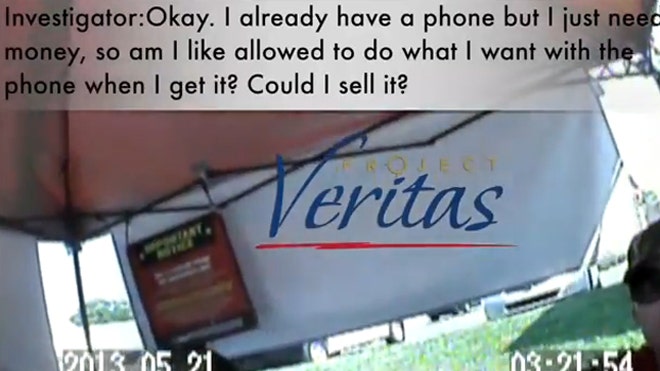A Republican senator renewed his criticism of a government-backed program that hands out cell phones after an undercover video showed vendors helping people obtain the phones even after saying they wanted to sell them for drugs and other items.
The video was released by conservative activist James O'Keefe and his group Project Veritas. It claimed to show undercover investigators visiting Philadelphia locations for phone vendor Stand Up Wireless and locations for one other company.
and his group Project Veritas. It claimed to show undercover investigators visiting Philadelphia locations for phone vendor Stand Up Wireless and locations for one other company.
In one exchange, the investigator -- posing as someone who wants a free phone -- asks if the phone will belong to him after he gets it.
"Whatever you want to do with it," the worker says.
The investigator floats the possibility of getting "money for heroin." The employee responds: "Hey, I don't judge."
Global Connection Inc. of America, the parent company for Stand Up Wireless, has already taken disciplinary action against the employees in question.
"Any employee involved has already been terminated," CEO Dave Skogen told FoxNews.com.
But Sen. David Vitter, R-La., who has long been critical of the phone hand-out program -- which was dubbed the "Obamaphone" during the 2012 campaign -- slammed the initiative in light of the video.
"The free government cell phones issue just keeps getting more outrageous," Vitter said in a statement. "This phone program has expanded far beyond its original intent, and having Washington force people to pay for free cell phones for others is offensive enough, but the waste, fraud and abuse is beyond words."
Vitter has previously, and unsuccessfully, pushed legislation to strip funding for cell phones under the Lifeline program. He wants the program to focus only on landline services.
The 22-minute Project Veritas video showed undercover activists going to several locations and asking about the phones. It's unclear how many locations they ultimately visited before recording the exchanges shown in the video.
In one exchange, which apparently happened in May, a Stand Up Wireless vendor told the activist that the phone would belong to him if he got it.
The activist then asked the worker about the phone's value. The worker recommended going to "any pawn shop. They'll be more than happy to tell you."
"So I could get the phone and then sell it?" he said.
"Yeah -- I don't care what you do with it," the worker replied.
The program was originally launched under the Reagan administration to help poor people have access to phones for emergencies, job searches and other vital communications. The program is funded by charges that appear on the monthly bills of every phone customer in the country.
The cost of the program, though, has tripled to $2.2 billion in 2012 from $819 million in 2008, when cell phones were added. The risk of abuse has also risen.
The video was released by conservative activist James O'Keefe
 and his group Project Veritas. It claimed to show undercover investigators visiting Philadelphia locations for phone vendor Stand Up Wireless and locations for one other company.
and his group Project Veritas. It claimed to show undercover investigators visiting Philadelphia locations for phone vendor Stand Up Wireless and locations for one other company.In one exchange, the investigator -- posing as someone who wants a free phone -- asks if the phone will belong to him after he gets it.
"Whatever you want to do with it," the worker says.
The investigator floats the possibility of getting "money for heroin." The employee responds: "Hey, I don't judge."
Global Connection Inc. of America, the parent company for Stand Up Wireless, has already taken disciplinary action against the employees in question.
"Any employee involved has already been terminated," CEO Dave Skogen told FoxNews.com.
But Sen. David Vitter, R-La., who has long been critical of the phone hand-out program -- which was dubbed the "Obamaphone" during the 2012 campaign -- slammed the initiative in light of the video.
"The free government cell phones issue just keeps getting more outrageous," Vitter said in a statement. "This phone program has expanded far beyond its original intent, and having Washington force people to pay for free cell phones for others is offensive enough, but the waste, fraud and abuse is beyond words."
Vitter has previously, and unsuccessfully, pushed legislation to strip funding for cell phones under the Lifeline program. He wants the program to focus only on landline services.
The 22-minute Project Veritas video showed undercover activists going to several locations and asking about the phones. It's unclear how many locations they ultimately visited before recording the exchanges shown in the video.
In one exchange, which apparently happened in May, a Stand Up Wireless vendor told the activist that the phone would belong to him if he got it.
The activist then asked the worker about the phone's value. The worker recommended going to "any pawn shop. They'll be more than happy to tell you."
"So I could get the phone and then sell it?" he said.
"Yeah -- I don't care what you do with it," the worker replied.
The program was originally launched under the Reagan administration to help poor people have access to phones for emergencies, job searches and other vital communications. The program is funded by charges that appear on the monthly bills of every phone customer in the country.
The cost of the program, though, has tripled to $2.2 billion in 2012 from $819 million in 2008, when cell phones were added. The risk of abuse has also risen.
read rest of article here: http://www.foxnews.com/politics/2013/06/18/video-shows-workers-offering-obamaphones-to-those-vowing-to-sell-them/

No comments:
Post a Comment